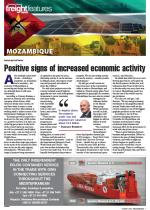Mozambique is continuing to offer major opportunities to the logistics sector thanks to new projects as well as maintenance and upgrades of existing infrastructure.According to Philipp Buechler, managing director for DSV Mozambique, the company has gone from strength to strength in the country, building up the necessary experience and knowledge required for successful operations in the market.“We have grown our footprint significantly in the country and the region over the past few years, setting ourselves up as a service provider of choice,” he said. “With headquarters in Maputo, the company is able to service the entire country through our smaller branch offices in Temane, Beira, Tete, Nacala and Pemba.”According to Buechler, having a presence on the ground is an important element of successful operations in Mozambique. “Each region has its own unique requirements, and having the necessary resources on the ground goes a long way,” he said.In Temane DSV is working closely with Sasol which is involved in a major $2-billion energy project. The ground was broken on the development earlier this year. The project comprises the 450MW Central Termica de Temane (CTT) power plant and the associated 563-kilometre-long Temane transmission project (TTP). “Not only is there opportunity in new project development, but also in servicing the ongoing needs of the existing infrastructure, including the pipeline to South Africa,” said Buechler.In Nacala there are also several big projects to keep an eye on that hold potential for the logistics sector, making it important to have a presence there.“It is a complicated port and logistics set up in Nacala – and being able to operate from the port and close to the sites was crucial in our decision to set up a local office. Handling cargo well is very much dependent on the ability to micromanage and having a local footprint.”According to Buechler, there are also developments in Tete – such as the planned Mphanda Nkuwa Hydroelectric Project (MNK), a $4.5bn project on the Zambezi River.“In Pemba, we have maintained our presence. Here we have supported Eni’s offshore project through our service companies.”In Beira, Buechler said, the company was seeing a definite boom at its facility which handled large volumes of transhipment cargo for Zambia, Zimbabwe and Malawi.“Overall we have a very positive outlook for Mozambique. It does, to a large extent, depend on which field you play, but we have a variety of clients, and thanks to our ability to service a diverse range of sectors we have seen our footprint grow.”He said work in Mozambique was still largely project-based, and with this in mind the company had positioned itself in three segments – oil and gas, renewables and project cargo.“We have just finalised a project for the Metoro solar power plant in the north-east of the country and are busy with a second project – also in the renewable sector. In Temane work is gearing up as that project gets under way.”He said the biggest challenge for the logistics sector was to ensure uninterrupted service, which was not easy due to the current global container shortage. “It is very difficult to get hold of empty containers, and the surge in freight rates has had a major impact, particularly on the project sector.”He said Covid-19 had also seen many projects being put on hold, while the security situation in the north of Mozambique had increased the risk for investors, with many taking a wait-and-see approach.“Despite this, we have seen a surge in projects – and the forecast is very promising,” said Buechler. “The gas developments are very exciting and could be a game changer for the country.”He said DSV would continue to invest in people and equipment in Mozambique. “You need to understand the local landscape as well as have the expertise required for international logistics. We have managed to develop our team in Mozambique to tick all the boxes.”

